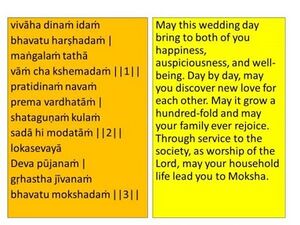Talk:Pursuit of Mokṣa by the Married Couple
By Vishal Agarwal
From Trivarga to Mokṣa
In general, the life of householders is very busy as they are raising their family and supporting the society. Mokṣa naturally takes a rear seat. Nevertheless, the couple must pursue the trivarga (first three puruṣārthas – dharma, kāma and artha) in such a way that they can easily and smoothly switch their priorities to mokṣa as they advance in age. In this regard, the following advice from the Mahābhārata is very apt:
- Bhīṣma said –
Desire for the fruits of one’s actions is the defect of dharma. Hoarding is the defect of artha. Excessive indulgence is the defect of kāma. But when these three (dharma, artha and kāma) are free of their respective defects, they become conducive to one’s welfare. Mahābhārata 12.123.10
A scholar very rightly remarks:
- In Hindu view, marriage is not a concession to human weakness, but a means for spiritual growth. Man and woman are soul mates who, through the institution of marriage, can direct the energy associated with their individual instincts and passions into the progress of their souls. Family life is a training ground for a man to practice divine love through human love, patience, consideration of others, forgiveness, respect, kindness and self-control. These spiritual qualities, when developed, contribute to a happy marriage and accelerate spiritual progress.
Swami Tejomayananda has written a very beautiful song that summarizes the entire purpose of a married life:

